【高中英语试卷】福建省四地六校2015-2016学年高二上学期第二次联考(11月)英语答案
- 格式:doc
- 大小:62.50 KB
- 文档页数:3
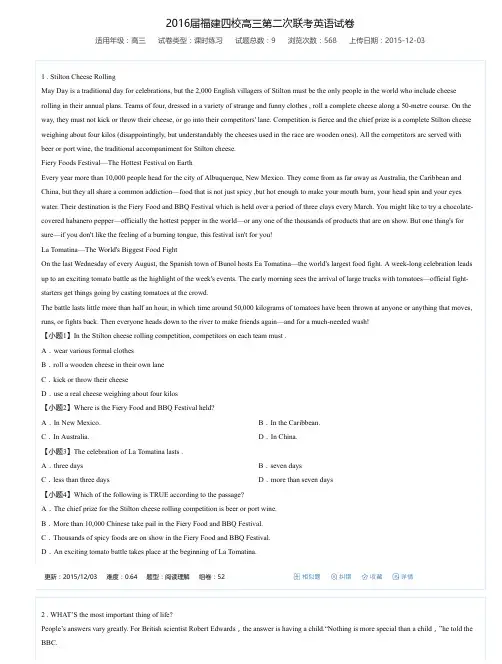
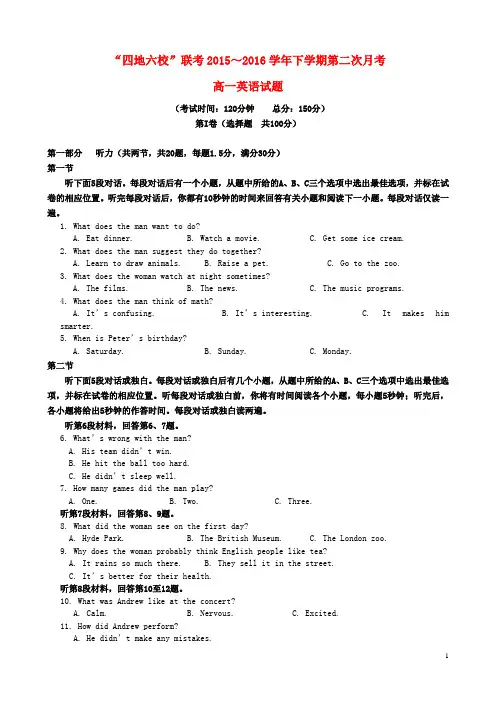
“四地六校”联考2015~2016学年下学期第二次月考高一英语试题(考试时间:120分钟总分:150分)第I卷(选择题共100分)第一部分听力(共两节,共20题,每题1.5分,满分30分)第一节听下面5段对话。
每段对话后有一个小题,从题中所给的A、B、C三个选项中选出最佳选项,并标在试卷的相应位置。
听完每段对话后,你都有10秒钟的时间来回答有关小题和阅读下一小题。
每段对话仅读一遍。
1. What does the man want to do?A. Eat dinner.B. Watch a movie.C. Get some ice cream.2. What does the man suggest they do together?A. Learn to draw animals.B. Raise a pet.C. Go to the zoo.3. What does the woman watch at night sometimes?A. The films.B. The news.C. The music programs.4. What does the man think of math?A. It’s confusing.B. It’s interesting.C. It makes himsmarter.5. When is Peter’s birthday?A. Saturday.B. Sunday.C. Monday.第二节听下面5段对话或独白。
每段对话或独白后有几个小题,从题中所给的A、B、C三个选项中选出最佳选项,并标在试卷的相应位置。
听每段对话或独白前,你将有时间阅读各个小题,每小题5秒钟;听完后,各小题将给出5秒钟的作答时间。
每段对话或独白读两遍。
听第6段材料,回答第6、7题。
6. What’s wrong with the man?A. His team didn’t win.B. He hit the ball too hard.C. He didn’t sleep well.7. How many games did the man play?A. One.B. Two.C. Three.听第7段材料,回答第8、9题。

“四地六校”联考2015-2016学年下学期第一次月考高二英语试题(考试时间:120 分钟总分:150 分)::第Ⅰ卷第一部分:听力(共两节,满分30分)第一节(共5小题;每小题1.5分, 满分7.5分)听下面5段对话。
每段对话后有一个小题,从题中所给的A、B、C三个选项中选出最佳选项,并标在试卷的相应位置。
听完每段对话后,你都有10秒钟的时间来回答有关小题和阅读下一小题。
每段对话仅读一遍。
1. Why is the man going to New York?A. To have a holidayB. To attend a meetingC. To see his grandparents2. How was the weather at noon?A. CoolB. ColdC. Hot3. Who had a car accident?A. BillB. DickC. John4. What do the speakers think of Carl?A. ModestB. KindC. Stubborn5. What can we learn from the conversation?A. The man missed the meeting completely.B. The man was late for the meeting.C. The man attended the meeting on time.第二节(共15小题;每小题1.5分,满分22.5分)听下面5段对话。
每段对话后有几个小题,从题中所给的A、B、C三个选项中选出最佳选项,并标在试卷的相应位置。
听每段对话前,你将有时间阅读各个小题,每小题5秒钟;听完后,各小题将给出5秒钟的作答时间。
每段对话读两遍。
听第6段材料,回答第6、7题。
6. When did the woman’s grandmother give her the necklace?A. Before her deathB. At the woman’s weddingC. On the woman’s birthday7. Where is the beautiful vase from?A. CanadaB. JapanC. China听第7段材料,回答第8、9题。
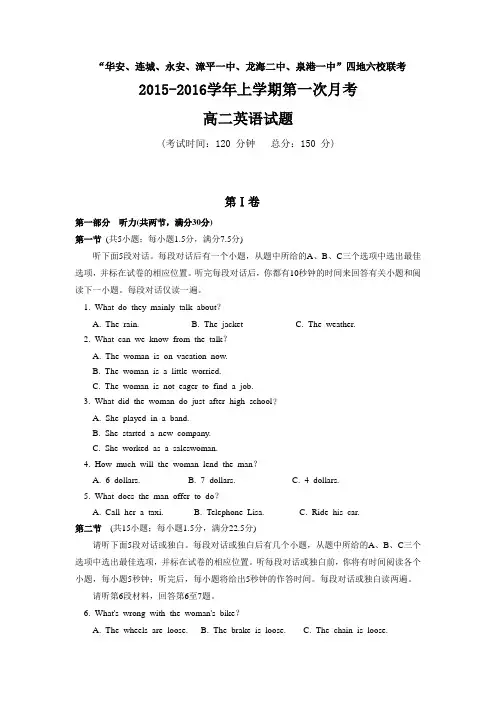
“华安、连城、永安、漳平一中、龙海二中、泉港一中”四地六校联考2015-2016学年上学期第一次月考高二英语试题(考试时间:120 分钟总分:150 分)第Ⅰ卷第一部分听力(共两节,满分30分)第一节(共5小题;每小题1.5分,满分7.5分)听下面5段对话。
每段对话后有一个小题,从题中所给的A、B、C三个选项中选出最佳选项,并标在试卷的相应位置。
听完每段对话后,你都有10秒钟的时间来回答有关小题和阅读下一小题。
每段对话仅读一遍。
1. What do they mainly talk about?A. The rain.B. The jacketC. The weather.2. What can we know from the talk?A. The woman is on vacation now.B. The woman is a little worried.C. The woman is not eager to find a job.3. What did the woman do just after high school?A. She played in a band.B. She started a new company.C. She worked as a saleswoman.4. How much will the woman lend the man?A. 6 dollars.B. 7 dollars.C. 4 dollars.5. What does the man offer to do?A. Call her a taxi.B. Telephone Lisa.C. Ride his car.第二节(共15小题;每小题1.5分,满分22.5分)请听下面5段对话或独白。
每段对话或独白后有几个小题,从题中所给的A、B、C三个选项中选出最佳选项,并标在试卷的相应位置。

莆田四中2015-2016学年上学第二次月考高二年段英语科第Ⅰ卷第一部分听力(共两节,满分30分)第一节(共5小题;每小题1.5分,满分7.5分)听下面5段对话。
每段对话后有一个小题,从题中所给的A、B、C三个选项中选出最佳选项,并标在试卷的相应位置。
听完每段对话后,你都有10秒钟的时间来回答有关小题和阅读下一小题。
每段对话仅读一遍。
1.Where is the man’s mother now?A. At home.B. In a hospital.C. In her office.2. What will the woman do on Friday?A. Go on a tour with the man.B. Take an examination.C. Study at home.3. What will the woman probably do?A. Call a repairman soon.B. Ask the man to fix her fridge.C. Wait to see if the problem will disappear.4. What do we know about the man?A. He likes his job very much.B. He will not give up his job.C. He has a large family to support.5. How will the guests go to New York?A. By train.B. By taxi.C. By plane.第二节(共15小题;每小题1.5分,满分22.5分)听下面5段对话或独白。
每段对话或独白后有几个小题,从题中所给的A、B、C三个选项中选出最佳选项,并标在试卷的相应位置。
听每段对话或独白前,你将有时间阅读各个小题,每小题5秒钟;听完后,各小题将给出5秒钟的作答时间。
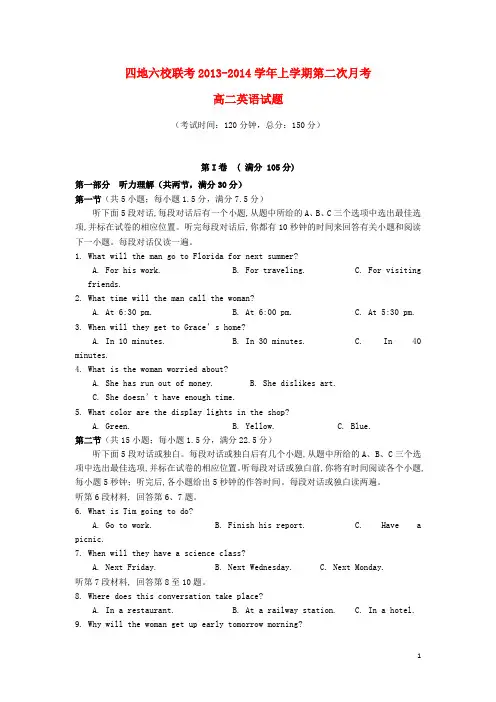
四地六校联考2013-2014学年上学期第二次月考高二英语试题(考试时间:120分钟,总分:150分)第I卷 ( 满分 105分)第一部分听力理解(共两节,满分30分)第一节(共5小题;每小题1.5分,满分7.5分)听下面5段对话,每段对话后有一个小题,从题中所给的A、B、C三个选项中选出最佳选项,并标在试卷的相应位置。
听完每段对话后,你都有10秒钟的时间来回答有关小题和阅读下一小题。
每段对话仅读一遍。
1. What will the man go to Florida for next summer?A. For his work.B. For traveling.C. For visitingfriends.2. What time will the man call the woman?A. At 6:30 pm.B. At 6:00 pm.C. At 5:30 pm.3. When will they get to Grace’s home?A. In 10 minutes.B. In 30 minutes.C. In 40 minutes.4. What is the woman worried about?A. She has run out of money.B. She dislikes art.C. She doesn’t have enough time.5. What color are the display lights in the shop?A. Green.B. Yellow.C. Blue.第二节(共15小题;每小题1.5分,满分22.5分)听下面5段对话或独白。
每段对话或独白后有几个小题,从题中所给的A、B、C三个选项中选出最佳选项,并标在试卷的相应位置。
听每段对话或独白前,你将有时间阅读各个小题,每小题5秒钟;听完后,各小题给出5秒钟的作答时间。
每段对话或独白读两遍。

【关键字】学期“华安、连城、泉港、永安、漳平一中,龙海二中”六校联考2016~2017学年上学期第二次月考高二英语试题(考试时间:120 分钟总分:150 分)第Ⅰ卷第一部分:听力(共两节,满分30分)第一节(共5小题;每小题1.5分, 满分7.5分)听下面5段对话。
每段对话后有一个小题,从题中所给的A、B、C三个选项中选出最佳选项,并标在试卷的相应位置。
听完每段对话后,你都有10秒钟的时间来回答有关小题和阅读下一小题。
每段对话仅读一遍。
1. Whose birthday is it today probably?A.Sue’s.B.Jim’s.C.Tracy’s.2. What will the man probably take?A. His own umbrella.B. The woman’s umbrella.C. The woman’s raincoat.3. What do we know about the man’s vacation?A. The weather was fine all the time.B. It was better than the previous one.C. It was very terrible.4. How many people have been to ?A. 1.B. 2C.3.5. What was the result of the match?A. The man’s team lost.B. The man's team won.C. It ended in a draw.第二节(共15小题;每小题1.5分,满分22.5分)听下面5段对话或独白。
每段对话或独白后有几个小题,从题中所给的A、B、C三个选项中选出最佳选项,并标在试卷的相应位置。
听每段对话或独白前,你将有时间阅读各个小题,每小题5秒钟;听完后,各小题将给出5秒钟的作答时间。
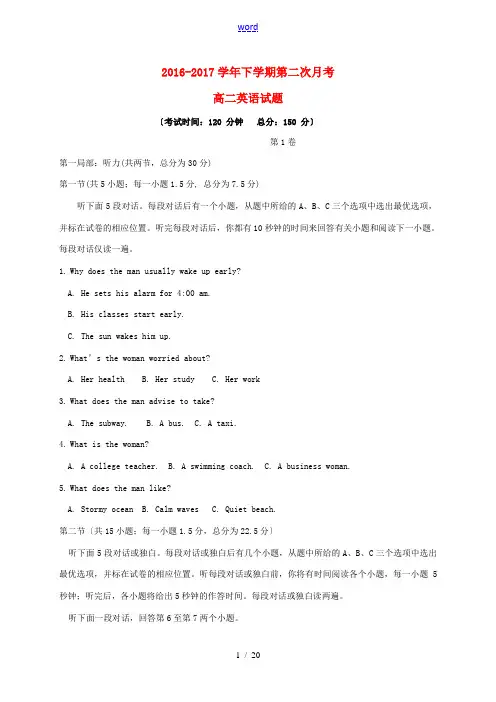
2016-2017学年下学期第二次月考高二英语试题〔考试时间:120 分钟总分:150 分〕第1卷第一局部:听力(共两节,总分为30分)第一节(共5小题;每一小题1.5分, 总分为7.5分)听下面5段对话。
每段对话后有一个小题,从题中所给的A、B、C三个选项中选出最优选项,并标在试卷的相应位置。
听完每段对话后,你都有10秒钟的时间来回答有关小题和阅读下一小题。
每段对话仅读一遍。
1.Why does the man usually wake up early?A. He sets his alarm for 4:00 am.B. His classes start early.C. The sun wakes him up.2.What’s the woman worried about?A. Her healthB. Her studyC. Her work3.What does the man advise to take?A. The subway.B. A bus.C. A taxi.4.What is the woman?A. A college teacher.B. A swimming coach.C. A business woman.5.What does the man like?A. Stormy oceanB. Calm wavesC. Quiet beach.第二节〔共15小题;每一小题1.5分,总分为22.5分〕听下面5段对话或独白。
每段对话或独白后有几个小题,从题中所给的A、B、C三个选项中选出最优选项,并标在试卷的相应位置。
听每段对话或独白前,你将有时间阅读各个小题,每一小题5秒钟;听完后,各小题将给出5秒钟的作答时间。
每段对话或独白读两遍。
听下面一段对话,回答第6至第7两个小题。
6.What does the man want to have?A. Steak, fries and juiceB. Steak, fries and coffee.C. Steak, salad and water.7.Why does the man need to wait that long?A. There’re many customers.B. They are short of hands.C. Steak takes a bit longer to prepare听下面一段对话,回答第8至第9两个小题。

2015-2016学年福建省泉州市四校联考高二英语第I卷 (选择题部分,满分100分)第二部分阅读理解 (共两节,满分40分)第一节(共15小题;每小题2分,满分30分)阅读下列短文,从每题所给的四个选项(A、B、C和D)中,选出最佳选项,并在答题卡上将该项涂黑。
APerhaps Joe Cheng has become popular with thousands of fans and has been chased by girls and middles students. But do you know his resume(简历)?Yes. Joe Cheng, who plays the most popular boy in high school in the popular Taiwanese drama “It Started with a Kiss.”Although thousands of girls have fallen in love with him for his cute smile and strong body, Cheng, 27, doesn’t want to rest on his good looks. He made the move from modeling to acting six years ago, and now he is trying another career-thi s time, to be a singer. Cheng worked on his first album, “Joe Cheng’s Day”, for a year. It came out on September 7.Apart from recording his CD, Cheng has been practicing dance moves for his music video. Given his height, 188cm, this was not an easy job. “I had bad dreams about dancing,” he said.Cheng’s life has had many ups and downs. His parents divorced whe n he was in primary school and he has lived with his father ever since. After dropping out of high school, he took on all kinds of jobs before being spotted by a scout(星探)for a modeling agency. Cheng said his key to life is “keeping a positive outlook and making the most out of life.”Cheng admitted that he got bad grades when he was in high school. But he was still very popular at school. “Being very active in the students union, I was elected president. I liked to organize parties and field trips, so many teachers and students knew me,” he said.Cheng once dreamed of becoming a cartoonist, and he regrets that he never did it. Now he hopes his teenage fans can learn from his life. “When you are in school, just focus on studies,” Cheng said. “Every young hea rt is eager to explore the world outside. But take your time. Finish your studies first.”21. Which of the following can be the best title for this text?A. Finish Your Study First.B. Life Is Fullof Ups and Downs.C. He Has It All, but Still Has Regrets.D.The Key to Success.22. What career didn’t Joe Cheng try?A. Acting in some dramas.B. Dancing foran agency.C. Modeling for an agency.D. Recording hisown CDs.23. The underlined word “outlook” in Paragraph 4 means __________.A. attitudeB. sceneC. fameD.appearance24. Which of the correct order of these events?a. Joe Cheng dropped out of high school.b. Joe Cheng worked on his first album, “Joe Cheng’sDay”.c. Joe Cheng’s parents divorced.d. Joe Cheng played the most pop ular boy in “It startedwith a Kiss”.e. Joe Cheng worked in a modeling agency.A. a c e d bB. c a e b dC. c a e d bD.a c eb dBThere is a problem discussed by people about whether parents should hit their children? Or should they ever beat them?Research suggests many of us are likely to respond “no”, and public support for spanking(打屁股)has been falling over the years. But surveys also show that 75 percent to nearly 90 percent of parents admit to spanking their child at least once.I was raised in a zero-tolerance home for disrespect, and my parents often turned to physical punishment. And, no, I don’t feel I was damaged by it.Nothing is more annoying than watching ill-mannered behavior from children. But there is data to suggest that a return to old-school spanking isn't the answer. Two years ago, Newsweek reported that it had found data suggesting that teens whose parents used physical punishment were more likely to become aggressive.Murray Straus, professor at the University of New Hampshire in America, has studied the topic of children and spanking for decades. He said that children who were physically punished have lower IQs than their peers. It may be that children with lower IQs were more likely to get spanked, but the punishment may have been counterproductive(反作用的)to their mental development, as well.Some researchers make the argument that occasional open-handed smacks(用巴掌打)on the bottom are not only harmless but can have some benefit.Last year, Marjorie Gunnoe, a psychologist at Calvin College, studied teens whohave never been spanked. There are a greater number of children growing up without ever having been physically punished. Gunnoe’s research suggests they don’t turn out any better than those wh o were sometimes spanked.There are some parents who simply cannot control their tempers(脾气). But I still believe that the best parents are the ones who are able to offer fair and firm discipline(纪律,约束) without ever tur ning to physical punishment.25. According to the first three paragraphs, the author was probably hit by her parentswhen __________.A. they were dissatisfied with her grade.B. they cannot control their temper.C. she showed no respect for the elder.D. their discipline turns out to be not strict enough.26. According to Murray Straus, children who are physically punished __________.A. are less aggressive toward others when they get olderB. may develop lower IQs than their peersC. benefit from occasional spankingD. have slower physical development27.The author seems to agree that __________.A. parents should determine whether a child needs to be smacked or notB. children who have been spanked tend to behave better than those who haven'tC. physical punishment should be the last resort(手段)of any parentD. good parents discipline their children in a fair and reasonable wayCTowards evening, Jennifer was walking on the beach with a gentle breeze blowing through her hair. Looking up at the golden red sun ball, she was surprised by its color, deep red in the middle, softly fading into yellow. She could hear nothing but the waves and the seagulls flying up above in the sky.The atmosphere relaxed her. This was what she needed. “It’s getting late,” she thought, “I must go home. My par ents will be wondering where I am.” She wondered how her parents would react when she got home after the three days she was missing. She kept on walking, directing herself to bungalow(平房)163, where she sp ent every summer holiday. The road was deserted. She walked slowly and silently. Just in a few hundred meters, she would have been safe in her house.It was really getting dark now. She wished she had her favorite coat on. It mightkeep her really warm. She imagined having it with her. This thought dissipated(消散) when she finally saw her front door. It seemed different. Nobody had taken care of the outside garden for a few days. She was shocked: her father was usually so strict about keeping everything clean and tidy, and now…She entered the house. First, she went into the kitchen and saw a note written by her father,“Dear Ellen, there’s some coffee ready; I went looking.” But where was Ellen? On the right side of the hallway was her parents’ room. She went in and saw her. Her mother, lying on the bed, w as sleeping. Her face looked so tired, as if she hadn’t slept for days. She was really pale. Jennifer would have wanted to wake her up, but she looked too tired. So Jennifer just fell asleep beside her. When Jennifer woke up something was different. She wa sn’t in her mother’s room and she wasn’t wearing the old clothes she ran away in. She was in her cozy bed in her pajamas(睡衣).It felt so good being back home. Suddenly she heard a voice. “Are you feeling better now, dear? You know you got us very, very sca red.”28. The author mentions the views of the beach in Para. 1 in order to __________.A. tell us the time of the storyB. show Jennifer’s eased mindC. show Jennifer’s lonelinessD. indicate the beauty of nature29. Jennifer decided to go home because __________.A. it was getting coldB. she realized her parents were worriedC. she began to miss her parentsD. she knew nobody would take care of the garden30. What can we infer from the passage?A. Jennifer went home to fetch her favorite coat.B. Jennifer’s father was so worried that he couldn’t take care of the outside garden.C. Jennifer understood why the outside garden was left uncared for.D. Jennifer’s father used to be too strict with her.31. Which of the following shows the change of Jennifer’s feeling?A. Relaxed→Lonely→Tired→Upset.B. Angry→Relaxed→Fearful→Comfortable.C. Fearful→Relaxed→Cheerful→Lonely.D. Relaxed→Anxious→Shocked→Comfortable.DFor centuries, people have wondered about the strange things that they dream about. Some psychologists say that this nighttime activity of the mind has no special meaning. Others, however, think that dreams are an important part of our lives. In fact, many experts believe that dreams can tell us about a person's mind and emotions.Before modern times, many people thought that dreams contained messages from God. It was only in the twentieth century that people started to study dreams in a scientific way.The Austrian psychologist, Sigmund Freud, was probably the first person to study dreams scientifically. He believed that dreams allow people to express the feelings, thoughts, and fears that they are afraid to express in real life.The Swiss psychiatrist Carl Jun g, once a student of Freud' s. Jung, however, believed that the purpose of a dream was to communicate a message to the dreamer. He thought people could learn more about themselves by thinking about their dreams. For example, people who dream about falling may learn that they have too high an opinion of themselves. On the other hand, people who dream about being heroes may learn that they think too little of themselves.Modern-day psychologists continue to develop theories about dreams. For example, psychologist William Domhoff from UCSC (the University of California, Santa Cruz), believes that dreaming is a mental (精神的) skill that needs time to develop. His research shows that children do not dream as much as adults.Another psychologist Adam Schneider, also from UCSC, has found that the dreams of men and women are different. For example, the people in men’s dreams are often other men, and the dreams often involve fighting. This is not true of women's dreams.Can dreams help us understand ourselves? Psychologists continue to try to answer this question in different ways. However, one thing they agree on is this: If you dream that something terrible is going to occur, you shouldn't panic. The dream may have meaning, but it does not mean that some terrible event will actually take place.32. Before the 1900s, ______.A. people considered dreams meaninglessB. there were no scientific studies of dreamsC. psychologists had no idea about dreamsD. dreams were thought to happen only at night33. We can infer from Carl Jung’s research that _______.A. he disagreed with Freud’s idea about dreamsB. dreams are an expression of a person’s wishesC. he proved that Freud’s idea about dreams was trueD. how people think of themselves is affected by their dreams34. Who found a connection between dreams and age?A. Carl JungB. Adam SchneiderC. Sigmund FreudD. William Domhoff35. What’s the best title for the text?A. What’s Dream?B. Are Dreams Real?C. Famous Dream PsychologistsD. Dreams’ Influences on People’sLife第二节七选五阅读(共5小题;每小题2分,满分10分)根据短文内容,从短文后的选项中选出能填入空白处的最佳选项。

高二第二次月考英语试卷命题人:蔡文华审核人:林笛第一部分听力(共两节,满分30分)第一节(共5小题;每小题1.5分,满分7.5分)听下面5段对话.每段对话后有一个小题,从题中所给的A、B、C三个选项中选出最佳选项,并标在试卷的相应位置。
听完每段对话后,你都有10秒钟的时间来回答有关小题和阅读下一小题。
每段对话仅读一遍。
1。
What is the relationship between the two speakers?A. Waiter and customer。
B. Doctor and patient. C。
Mother and son。
2。
What time is it now?A。
9:55。
B. 10:00。
C. 10:30。
3。
What will the woman probably do?A。
Call a repair person soon。
B. Ask the man to fix her fridge。
C。
Wait to see if the problem will disappear。
4。
What will the woman most probably buy for her mother?A。
A computer. B. A mobile phone。
C。
A washing machine。
5。
What does the man mean?A。
He likes the school too much。
B。
He likes the uniform too much.C。
He doesn’t want to take off his uniform。
第二节(共15小题;每小题1。
5分,满分22。
5分)听下面5段对话或独白。
每段对话或独白后有几个小题,从题中所给的A、B、C三个选项中选出最佳选项,并标在试卷的相应位置。
听每段对话或独白前,你将有时间阅读各个小题,每小题5秒钟;听完后,各小题给出5秒钟的作答时间。
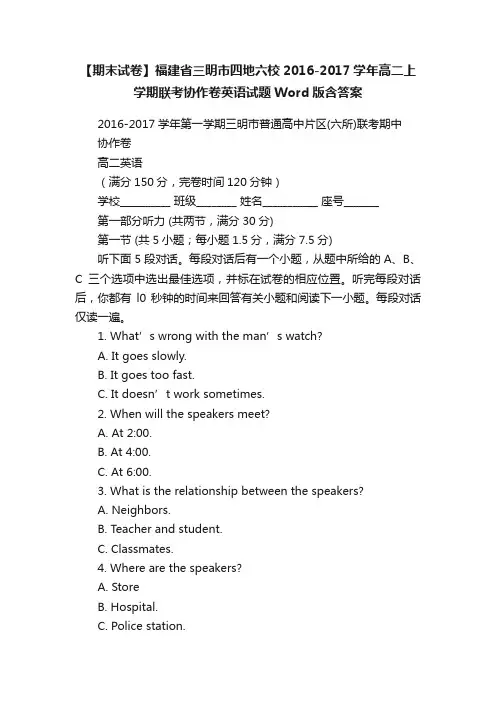
【期末试卷】福建省三明市四地六校2016-2017学年高二上学期联考协作卷英语试题Word版含答案2016-2017学年第一学期三明市普通高中片区(六所)联考期中协作卷高二英语(满分150分,完卷时间120分钟)学校__________ 班级________ 姓名___________ 座号_______第一部分听力 (共两节,满分30分)第一节 (共5小题;每小题1.5分,满分7.5分)听下面5段对话。
每段对话后有一个小题,从题中所给的A、B、C三个选项中选出最佳选项,并标在试卷的相应位置。
听完每段对话后,你都有l0秒钟的时间来回答有关小题和阅读下一小题。
每段对话仅读一遍。
1. What’s wrong with the man’s watch?A. It goes slowly.B. It goes too fast.C. It doesn’t work sometimes.2. When will the speakers meet?A. At 2:00.B. At 4:00.C. At 6:00.3. What is the relationship between the speakers?A. Neighbors.B. Teacher and student.C. Classmates.4. Where are the speakers?A. StoreB. Hospital.C. Police station.5. Why did the woman make Mr. Jones angry?A. She asked the answered question again.B. She didn’t finish her work in 20 minutes.C. She asked the same question three times.第二节 (共15小题,每小题1.5分,满分22.5分)听下面5段对话或独白。
“华安、连城、永安、漳平一中、龙海二中、泉港一中”六校联考2015~2016学年上学期第二次月考高一英语试题(考试时间:120分钟总分:150分)本试卷分第Ⅰ卷和第Ⅱ卷两部分,共10页。
第Ⅰ卷第一部分听力(共两节,满分30分)做题时,先将答案标在试卷上,录音内容结束后,你将有两分钟的时间将试卷上的答案转涂到答题卡上。
第一节(共5小题;每小题1.5分,满分7.5分)听下面5段对话。
每段对话后有一个小题,从题中所给的A、B、c三个选项中选出最佳选项,并标在试卷的相应位置。
听完每段对话后,你都有10秒钟的时间来回答有关小题和阅读下一小题。
每段对话仅读一遍。
1. What will the woman do tonight?A. Work.B. Stay home.C. Go to a pub.2. What does the man think the weather will be like?A. Cloudy.B. Sunny. C.Rainy3. How many people are there in the man's basketball team?A. 9.B.10.C.15.4. Where is the man's sister going next summer?A. To AfricaB. To South America.C. To Australia.5. Where are the speakers?A. In a zoo.B. At their house.C. In an office第二节(共15小题;每小题1.5分,满分22.5分)听下面5段对活或独白。
每段对话或独白后有几个小题,从题中所给的A、B、C三个选项中选出最佳选项,并标在试卷的相应位置。
听每段对话或独白前,你将有时间阅读各个小题,每小题5秒钟;听完后,各小题将给出5秒钟的作笞时间。
每段对话或独白读两遍。
2015~2016学年上学期第二次月考高一英语试题(考试时间:120分钟总分:150分)命题人:华安一中审题人: 华安一中本试卷分第Ⅰ卷和第Ⅱ卷两部分,共10页。
第Ⅰ卷第一部分:听力(共两节,满分30分)做题时,先将答案标在试卷上,录音内容结束后,你将有两分钟的时间将试卷上的答案转涂到答题卡上。
第一节(共5小题;每小题1.5分,满分7.5分)听下面5段对话。
每段对话后有一个小题,从题中所给的A、B、c三个选项中选出最佳选项,并标在试卷的相应位置。
听完每段对话后,你都有10秒钟的时间来回答有关小题和阅读下一小题。
每段对话仅读一遍。
1. What will the woman do tonight?A. Work.B. Stay home.C. Go to a pub.2. What does the man think the weather will be like?A. Cloudy.B. Sunny. C.Rainy3. How many people are there in the man's basketball team?A. 9.B.10.C.15.4. Where is the man's sister going next summer?A. To AfricaB. To SouthAmerica.C. To Australia.5. Where are the speakers?A. In a zoo.B. At their house.C. In an office第二节(共15小题;每小题1.5分,满分22.5分)听下面5段对活或独白。
每段对话或独白后有几个小题,从题中所给的A、B、C三个选项中选出最佳选项,并标在试卷的相应位置。
听每段对话或独白前,你将有时间阅读各个小题,每小题5秒钟;听完后,各小题将给出5秒钟的作笞时间。
每段对话或独白读两遍。
听第6段材料,回答第6、7题。
福建省四地六校2014-2015学年高二上学期第二次联考英语第一卷(选择题共105分)第一部分:听力(共两节,满分30分)做题时,先将答案标在试卷上。
录音内容结束后,你将有两分钟的时问将试卷上的答案转涂到答题卡上。
第一节(共5小题;每小题1.5分,满分7.5分)听下面5段对话。
每段对话后有一个小题,从题中所给的A、B、C三个选项中选出最佳选项,并标在试卷的相应位置。
听完每段对话后,你都有10秒钟的时间来同答有关小题和阅读下一小题。
每段对话仅读~遍。
第一节听下面5段对话。
每段对话后有一个小题,从题中所给的A、B、C三个选项中选出最佳选项,并标在试卷的相应位置。
听完每段对话后,你都有10秒钟的时间来回答有关小题和阅读下一小题。
每段对话仅读一遍。
1. What does the woman suggest the man do?A. Get a new letter.B. Use the old letter.C. Write the letterhimself.2. What will the man do tonight?A. Watch a basketball game.B. Take a plane to Washington.C. Go out to dinner with the woman.3. What does the man think of Mr. Addison?A. He is kind.B. He is always unfriendly.C. He is dishonest.4. What are the speakers complaining about?A. Fewer articles are printed now.B. They can’t see the words clearly.C. The newspaper is too long.5. What does the woman mean?A. The man should wear larger shoes.B. The man had better not take off his shoes.C. The man should go to buy some slippers.第二节听下面5段对话或独白。
2016—2017学年第一学期三明市普通高中片区(六所)联考期中协作卷高二英语(满分150分,完卷时间120分钟)学校__________ 班级________ 姓名___________ 座号_______第一部分听力(共两节,满分30分)第一节(共5小题;每小题1.5分,满分7。
5分)听下面5段对话。
每段对话后有一个小题,从题中所给的A、B、C三个选项中选出最佳选项,并标在试卷的相应位置.听完每段对话后,你都有l0秒钟的时间来回答有关小题和阅读下一小题。
每段对话仅读一遍。
1. What’s wrong with the man’s watch?A. It goes slowly。
B. It goes too fast. C。
It doesn’t work sometimes。
2. When will the speakers meet?A. At 2:00.B. At 4:00。
C。
At 6:00.3. What is the relationship between the speakers?A。
Neighbors. B. Teacher and student. C。
Classmates.4. Where are the speakers?A. StoreB. Hospital。
C. Police station。
5。
Why did the woman make Mr. Jones angry?A。
She asked the answered question again.B. She didn’t finish her work in 20 minutes。
C。
She asked the same question three times。
第二节(共15小题,每小题1.5分,满分22。
5分)听下面5段对话或独白。
每段对话或独白后有几个小题,从题中所给的A、B、C三个选项中选出最佳选项,并标在答题卷的相应位置.听每段对话或独白前,你将有时间阅读各个小题,每小题5秒钟;听完后, 各小题将给出5秒钟的作答时间。
2015-2016学年福建省四地六校高二上学期第二次联考(11月)英语(考试时间:120分钟总分:150分)第Ⅰ卷(选择题共92分答题卡计82分)第一部分听力(共两节,满分30分)第一节(共5小题;每小题1.5分,满分7.5分)听下面5段对话。
每段对话后有一个小题,从题中所给的A、B、C三个选项中选出最佳选项,并标在试卷的相应位置。
听完每段对话后,你都有10秒钟的时间来回答有关小题和阅读下一小题。
每段对话仅读一遍。
1.Who is Mr. White?A. A salesman.B. A repairman.C. A professor.2.Where does the woman work?A. At a hotelB. At a restaurant.C. At a department store.3.What time does the man think they will leave?A. At 7:15.B. At 7:35.C. At 7:25.4.What does the man mean?A. He liked the work very much.B. He didn’t like the work because it wasn’t interesting.C. He didn’t like the work so much because it kept him working long hours.5.What was the mark the woman got in her exam?A. 95B. 90C. 98第二节(共15小题;每小题1.5分,满分22.5分)听下面5段材料。
每段材料后有几个小题,从题中所给的A、B、C三个选项中选出最佳选项,并标在试卷的相应位置。
听每段材料前,你将有时间阅读各个小题,每小题5秒钟;听完后,各小题将给出5秒钟的作答时间。
每段材料读两遍。
“四地六校〞联考2015-2016学年下学期第一次月考高二英语试题〔考试时间:120 分钟总分:150 分〕::第1卷第一局部:听力(共两节,总分为30分)第一节(共5小题;每一小题1.5分, 总分为7.5分)听下面5段对话。
每段对话后有一个小题,从题中所给的A、B、C三个选项中选出最优选项,并标在试卷的相应位置。
听完每段对话后,你都有10秒钟的时间来回答有关小题和阅读下一小题。
每段对话仅读一遍。
1. Why is the man going to New York?A. To have a holidayB. To attend a meetingC. To see his grandparents2. How was the weather at noon?A. CoolB. ColdC. Hot3. Who had a car accident?A. BillB. DickC. John4. What do the speakers think of Carl?A. ModestB. KindC. Stubborn5. What can we learn from the conversation?A. The man missed the meeting completely.B. The man was late for the meeting.C. The man attended the meeting on time.第二节〔共15小题;每一小题1.5分,总分为22.5分〕听下面5段对话。
每段对话后有几个小题,从题中所给的A、B、C三个选项中选出最优选项,并标在试卷的相应位置。
听每段对话前,你将有时间阅读各个小题,每一小题5秒钟;听完后,各小题将给出5秒钟的作答时间。
每段对话读两遍。
听第6段材料,回答第6、7题。
6. When did the woman’s grandmother give her the necklace?A. Before her deathB. At the woman’s weddingC. On the woman’s birthday7. Where is the beautiful vase from?A. CanadaB. JapanC. China听第7段材料,回答第8、9题。
“华安、连城、永安、漳平一中,龙海二中,泉港一中”六校联考2015-2016学年高二上学期第二次月考参考答案第Ⅰ卷(选择题共92分)第一部分: 听力(共两节,满分30分)1--5. BABCB 6-10. CCABA 11-15. CCBBB 16-20.ABBCC第二部分阅读理解(共两节,满分32分)第一节(共11 小题;每小题2分,满分22 分)21-24 BDAC 25-27 BDB 28-31 CBCA第二节(共5小题,每小题2分,满分10分)本题不涂在答题卡上,填在第二卷相应位置1-5 DCABE第三部分英语知识运用第一节完形填空(共20 小题;每小题15 分,满分30 分)32-36 BCADA 37-41 BCDAC 42-46 DBACD 47-51 ACABD第II卷(非选择题共58分)第三部分英语知识运用第二节:完成句子(共8题,每题1分,共8分)52.squeezed rmed 54. poisoning 55.concentrate 56. applied to57. make no difference 58. In case of 59. by working hard can/will you第三节:语法填空(共10小题;每小题1.5分,满分15分)60. as 61. admirable 62. until 63. depending 64. interviewee 65. where66. deliberately 67. had tried 68. it 69. angry第四部分写作(共两节满分 35)第一节短文改错:第一行:two-days 改为two-day 第二行:mountain 前加a 第二行:noon后加when 第三行:them改为us 第四行:visiting 改为visited ,picture改为pictures;第五行passes改为passed,去down 第六行:and改为but 第七行:去at第二节:书面表达(满分25分)If we happen to witness or get involved in a traffic accident, what should we do to save other people’s lives? Knowing how to respond properly can make a big difference. Here are some rules that we can follow.First, we should stay calm and dial 110 and 120 at once. Second, don’t move the injured person! Leave him where he is.Third,we can ask simple questions such as “Are you OK?” to make the person’s condition clear. Fourth, we need to check the person’s breathing. If it is difficult for him to breathe, we should try to start his breathing right away with the mouth-to- mouth method. Last, if a person is bleeding, we need to stop the bleeding by pressing on the wound with a clean cloth.All the above done, we can stay with the person until the police and ambulance arrive.听力材料第一节听下面5段对话,回答第1~5小题。
(Text 1)M: My radio doesn’t work. What do you think I should do?W: Why not call Mr. White?(Text 2)M:I want to have this shirt washed and this suit dry-cleaned.W: Very well, sir. Your name and room number, please.(Text 3)M: Are we supposed to leave at 7:35?W: I’m not sure. All I remember is that the flight number is 733.(Text 4)W: How did you like your work as a reporter?M: Well, it was interesting. But I had to work long hours. I was never at home on weekends.(Text 5)W:I got 90 in my math exam.M:I got 9 5,but Linda was the best in my class. She got 98.第二节听第6段材料,回答第6~8小题。
(Text 6)W: Mr. Miller, you were late for work, weren’t you?M: Yes , I’m very sorry.W: Why did you get here so late?M:I watched TV till very late last night.W: What was on?M: It was an exc iting football match. France against Germany. When the France were about to win... So, I got up late and didn’t have breakfast and left home in a hurry.W: Did you catch the train?M: No, I called for a taxi. There were a lot of cars and buses on the highway. Unfortunately an accident happened. Then, there was a traffic jam. I was very anxious...W: What happened after that?M: The police came and solved the problem. I waited for a long time. When I got to the office, it was already 10 o’clock.W:I hope that you won’t be late again. Otherwise I will fire you.M: Sure, I’ll never be late again.听第7段材料,回答第9~11小题。
(Text 7)W:How were your exams,Mike?M: Not too bad. But I’m sure I made some mistakes in the science paper and maths paper.W: Me,too. The science paper was not easy this time, was it?M: It seems that our new science teacher likes to give us tough exams.W: I have the same feeling. He looks only 25 or so.M: Maybe he hopes to make us pay more attention to his lessons in this way.W: Really?M: Well. I’m only joking.听第8题材料,回答第12~14小题。
(Text 8)M:What can I do for you?W:I want to buy a sweater for my son. This yellow one doesn’t have a price on it. How much does it cost? Do you know?M:Yes, it’s £42.33.W:That’s too expensive.M:Here’s a nice nylon one for £15.88.We sell a lot of these.W:Yes, it is nice. I think I’ll take it.M:Do you want anything else? This kind of trousers is in discount. It only costs £13 each pair. W:That’s nice. OK, I’ll take one.听第9段材料,回答第15~17小题。
(Text 9)M: What’s your favourite sport, Susan?W: Football.M: Soccer or rugby?W: I prefer soccer. It’s a splendid game. But, like most of us, I just watch it. I watch a soccer match nearly every Saturday afternoon either at the local stadium or on TV. What about you, John?Do you play football?M:I’m afraid not. And I don’t watch it either. I know it’s Britain’s most popular outdoor game, but I never liked it, not even when I was at school.W:But don’t you watch the Cup finals and the great international matches between British teams and other national teams?M:Very rarely. My favourite game is cricket. I used to be quite a good cricket player when I was at school and I’ve kept it up ever since.W:It’s a very English game, isn’t it?M:Yes, it is. It has become popular in the Commonwealth countries. Do you ever watch the matches between England and the other Commonwealth countries?They’re very interesting and exciting. W:Yes, I watch the m on TV.听第10段材料,回答第18~20小题。